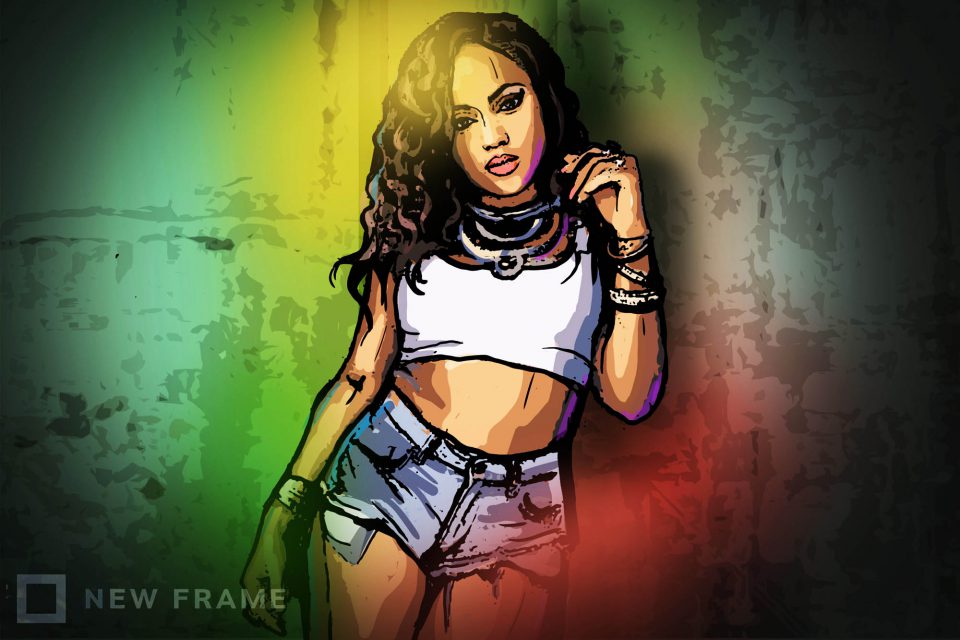Political Songs | Equal Rights – Ishawna
Dancehall is littered with blatant misogyny and homophobia and Ishawna takes it on with her defiant lyrics, dividing listeners into lovers and haters.
Author:
21 June 2019

Reggae almost got me killed once. About 10 years ago, a friend and I were in downtown Johannesburg in search of Jah Crucial, the owner of the most comprehensive reggae shop in town. He had apparently been kicked out of his premises, which were in a dilapidated building of mixed business and residential use near the Supreme Court.
Our Jah man now had a sidewalk stall nearby, although the directions were a bit vague. But a reggae fan maak ’n plan, the plan being to follow your nose to the sweetest-smelling area and there find Jah Crucial with a lazy smile, a fat doobie dangling from his lip and some loud, languorous reggae vibrating from his sound system. Simple enough.
Ever prepared, my mate had fired up a plump spliff on the way there to get him in the mood for Jah Crucial’s vibes. It made him several paces slower than me, a man on a mission for reggae records, as we hit the packed, peopled pavements.
As the only two pale people around, we attracted attention, probably looking like lost foreign tourists. At a narrowing of the sidewalk, a man with a nasty face shouted behind me: “Stop, now, this is a fucking robbery!” In front, three guys were “closing the gate”, blocking the way ahead at the end of the narrowing. They’ll have guns, a knife or a sharpened screwdriver flashed through my mind. Then they’ll steal the money destined for Jah Crucial’s sidewalk store.
I took off. My shoulder charge sent the thugs flying. Seconds later, my wide-eyed friend caught up with me. We walked off like people in those old black-and-white movies, at that speed just before they burst into a jog. “What the fuck?” he asked. Out of breath, I explained what had nearly happened.
“I think we’ll skip Jah Crucial today,” I said. Still vamoosing, we started to giggle.
I hooked up with Jah Crucial again on Facebook in 2013, around the time I had a Monday night reggae show on Radio Sonder Grense, the Afrikaans public radio station on the South African Broadcasting Corporation (SABC). He loved the show and even threatened a sit-in at the SABC with some other Rastas to keep the show running beyond its scheduled 13 weeks.
Then, early last year, we DJed together in the East Rand township of Vosloorus at a reggae street party, playing conscious roots reggae and blunted dub mainly from the genres’ heyday in the 1970s.
Pussycat among the pigeons
The younger guys on the decks after us played some dancehall, the stripped down (musically and otherwise), lascivious and lewd grandchild of reggae. They had the street rocking with dancers doing fancy steps.
“If it were simply the percussive beats and the chanting of the DJs that differentiated dancehall from reggae music, the ‘decent’ Jamaicans might not find it problematic,“ Khytie K Brown wrote in Ugandan journal Transition. “However, dancehall music features hardcore lyrics, commonly referred to as ‘slackness’ (vulgarity especially of a sexual nature), that leave nothing to the imagination. Not only are the lyrics speaking frankly about sex and sexual acts, they embrace profanity, violence, marijuana use, illegal ways of making a living, and other forms of behaviour considered deviant and associated with ‘ghetto-livity’ (ghetto life).”
Dancehall’s slackness doesn’t bother me that much, probably because I don’t understand the genre’s patois that well. Its blatant misogyny and homophobia do.
In April 2017, dancehall queen Ishawna set a pussycat among the genre’s male-dominated, chauvinist pigeons with the hugely controversial Equal Rights, a song graphically and unapologetically demanding justice between the sheets, specifically, a female wanting oral sex from her man.
Mi seh, equal rights and justice (I say, equal rights and justice)
Nuff ignorant people a guh cuss dis (A lot of ignorant people are going to curse about this)
She was very right about that. Ishawna, now 32, who grew up between Kingston in Jamaica and Brooklyn, New York, in the United States, exposed the fact that while dancehall is the most explicit of genres, oral sex remains a taboo. And as the hysterical, toxic backlash against Equal Rights has shown, Ishawna was wrong when she told her male protagonist:
A modern times now, boy, relax, it’s okay.
Angry response records
Reactionary male fans were deeply offended on social media. A number of angry response records were released, including Macka Diamond’s Nuh Tongue and Kiprich’s near pathological No Eating Rights. As Abe Beame wrote on the Passion of the Weiss music website: “Apparently a woman exists in dancehall to ‘whine’ and generally cater to a man. Taking agency has proven to offend the community’s stunningly delicate sensibilities.”
But the backlash shouldn’t be a massive surprise. It’s political and religious. In Jamaica, 80% of the population are religious, with most adhering to a brand of deeply conservative Christianity that dictates traditional gender roles. Many of dancehall’s leading artists sing from that very hymn sheet, so they were never going to encourage or defend women’s sexual liberation.
Pop culture site Konbini reminded distractors that Equal Rights wasn’t “about emasculating men, it’s a song about fairness and doing away with gender inequities, whether in the bedroom, the workplace, or anywhere they show up in the world”.
Artists like Tanya Stephens and Queen Ifrica, most female fans and men with feminist inclinations have supported Ishawna. Columnist Donovan Watkiss warned in the Jamaica Observer newspaper that “silencing the women and their respective plight is silencing the entire (dancehall) culture”.
But nobody is going to silence Ishawna:
Mi nuh fraid a nobody (I’m not afraid of anybody)
And wen mi a talk, mi nuh care who nuh like mi (And when I talk, I don’t care who doesn’t like me)
